- Home
- Alice Hoffman
White Horses Page 5
White Horses Read online
Page 5
Reuben laughed nervously. “I was only teasing you,” he said. “I know you won’t tell anyone. I know you’ll keep quiet.”
But he wasn’t teasing and Teresa knew it. He wouldn’t go back to Santa Rosa, and he knew where King Connors was. Teresa thought how much easier it was for her brothers; they didn’t have to wait for someone to come along and rescue them, they could go off and buy a train ticket to anywhere they wished.
At the end of summer, in the last week of August, Dina called her children to her room. The shutters over the window were closed and only a few rays of renegade light slipped through. For weeks now, Dina had stopped looking for traces of Arias. When the wind rose up in the evening and the vines on the trellis outside her window shuddered, Dina no longer imagined that a dark stranger was climbing up to the second-story bedroom, although not running over to the window to look out nearly broke her heart.
“We’re leaving tonight,” Dina said. “I made a mistake coming back here.” Dina went to the window and opened the shutters; her children blinked in the sudden light. “We’ll have dinner,” Dina said, “and then we’ll go. But don’t say a word to your grandmother. When we pick up our suitcases and walk out the door, that’s time enough for her to know.”
That night they all dressed for dinner. The tension at the table made Teresa feel shaky; Dina, who rarely drank, had three glasses of wine and didn’t touch her meal. Silver looked out the window and watched as Annette left the house to go home and wash her hair so that it would be dry in time for a date with Silver that wouldn’t be kept. When the grandmother poured herself a cup of coffee, Dina cleared her throat. “I’ve decided to leave,” she told her mother.
The grandmother stirred her coffee; the spoon hit against the edges of the cup. “You shouldn’t have gone in the first place, and you shouldn’t have come back. You do everything at the wrong time, Dina. You helped kill your father, then you came back. What do you expect me to say?”
Dina shrugged her shoulders. “You never cared about me,” she said. “Only my father cared.”
“Hah,” the grandmother said, sipping her coffee.
“I know he did,” Dina said. “He hired Bergen to find me.”
“So he hired a second-rate detective,” the grandmother said. “So what?”
Dina got up and pushed her chair away with a sweep of her arm. “I don’t have to listen to you.”
“You should have listened to me,” the grandmother said. “I told you not to go with that man of yours.”
Dina went to the closet where they had hidden their already packed suitcases. She struggled to pick them up; her dress was already wrinkled, and they hadn’t even started their trip.
“Well, don’t expect me to come back again,” Dina said.
“Who’s asking you to come back?” the old woman said.
“Let’s go,” Dina said, signaling to her children.
“Not him,” the grandmother said, pointing a finger at Silver.
“I said let’s go,” Dina repeated.
Teresa and Reuben got up from the table and went to the hallway where their mother stood. Silver sat in his chair, stone still.
“Did you hear me?” Dina said to Silver.
He was their grandmother’s favorite, and, if he stayed, there would be nothing she wouldn’t let him do; he could go out to the cafe every night, he could meet Annette and a dozen other women in a field near the graveyard where lovers went. If he stayed, he might inherit the old woman’s jewelry, the house, everything she owned.
Teresa waited for Silver’s decision. She could hear heavy breathing in the room, as if the dining-room walls had mouths, tongues, lungs filled with air.
“Silver stay here?” Dina laughed. “You’ve got to be kidding. In this house?” She looked at her son. “There’s nothing here,” she told him. “Believe me.”
“Stay,” the grandmother said to Silver, and Teresa nearly cried out loud; now she regretted having ever thought—however briefly—that Reuben might be her favorite brother. She couldn’t imagine leaving Silver behind, and she wondered if she might be allowed to stay on, too, if Silver said yes to their grandmother. She could have a room at the rear of the house, she could wash all of her grandmother’s laundry, on weekends she and Silver could go on long walks, in the opposite direction from the graveyard with the iron gates.
Their grandmother got up and walked over to Silver. He was still seated at the dinner table when the grandmother took her diamond earrings off and placed them in his hand. Silver kept his palm open; he stared at the diamonds, then he smiled. He clenched his hand into a fist and stood up. If he stayed in this house he was certain he would lose something, and not even diamonds could convince him to sit through a thousand polite dinners, afternoon teas, an old woman’s adoration.
“I’m sorry,” Silver said to his grandmother. He put the earrings into his shirt pocket, then kissed the old woman’s cheek. As soon as he said no to their grandmother, Teresa forgave Silver for dancing with Annette. She watched as Silver walked toward the front door. When he stopped to pick up a suitcase, Dina went over to him.
“Give those earrings back to her,” she said. “We don’t need anything from her.”
“Why should I?” Silver said. “I deserve them,” he told his mother. “I was nice to the old lady and she paid me back. I earned them.”
When Reuben and Silver carried the suitcases out to the road, Teresa stayed behind with Dina and studied her grandmother. The old woman stood beside the dining-room table. She looked older than anyone Teresa had ever seen before, and her eyes were damp.
“He’s a beautiful boy,” the grandmother explained.
“You can’t have him,” Dina said triumphantly.
“You,” the grandmother said, shaking her head. “You were always stupid. You had to run off with the first man who looked at you.”
“He wasn’t the first to look at me,” Dina said.
“You don’t even know how to bring up children,” the grandmother sighed. “You’ve taught that boy all the wrong things.”
Dina and her mother kissed goodbye, but they kissed lightly, separated by bitterness and the knowledge that they would never see each other again. Dina walked toward the hallway and the front door, and as Teresa was about to follow her she felt a hand on her shoulder. It was the first time all summer that her grandmother had touched her, and the old woman’s strength shocked Teresa.
“Don’t think I haven’t noticed you,” the grandmother told Teresa. “I’ve noticed you—you’re my granddaughter.”
Teresa heard the taxi pull up outside; she was certain that their suitcases were already being lifted into the trunk, but it seemed she was unable to move, her grandmother was still holding on to her shoulder and she could smell the old woman’s cologne, she could see the tears that had formed in her grandmother’s eyes but had never fallen.
“I had my reasons for wanting Silver to stay here,” the grandmother now said. “He’s dangerous, and I know it, but what could he do to an old lady like me—break my heart?”
Outside, the taxi honked its horn, but Teresa was held by her grandmother’s last words of advice.
“Remember to be careful,” the grandmother told Teresa. “Be smart. And remember that I noticed you.”
Teresa nodded and then ran toward the hallway and out the door. She stumbled in the garden, and when she reached the road Silver motioned to her to hurry.
“Look at these,” Silver whispered, once Teresa was inside the taxi. He opened his palm and showed Teresa the diamond earrings. “These are going to buy me a car.”
Silver put the earrings in Teresa’s hand for a moment; they seemed to burn, they moved with a dry, hot life of their own. “I don’t want these,” Teresa said.
“Good,” Silver said, taking the diamonds and returning them to his shirt pocket. “Because these sure aren’t for you.”
They drove away, down the gravel road, past the graveyard, past acres of flowers and dust. Then o
nto the train, and back to Los Angeles, where they would change trains. This trip seemed so much faster than the first that they were all surprised when they suddenly reached Los Angeles. Reuben inhaled deeply, as if he couldn’t get enough air. Just after they had changed trains, Reuben decided to get off and buy a newspaper. He put his hand on Teresa’s shoulder.
“So long,” he said to her.
Teresa looked the other way; she knew that he wouldn’t be back, knew he had King Connors’s address in his pocket, that he had plans.
“Look at me,” Reuben told her, and when she did, he shook his head. “Please understand,” he whispered. “I have to try this. I just can’t go back.”
When the train wheels started turning, and the porters called out every destination, Silver leaned out the open window.
“What about Reuben?” he said. “Should I go out and look for him?”
“I’m not an idiot,” Dina said. “I know where Reuben’s going. He wants to be with his father—let him go.”
“Maybe he didn’t hear the train whistle,” Silver said. “Maybe I should go look for him.”
Dina shook her head and smiled. “I’m not going to take the chance of losing you, too,” she told her favorite son. “It doesn’t hurt so much to lose one child,” she told them, but she didn’t mention that it mattered very much which child it was.
So it was only the three of them who returned to Santa Rosa to be greeted by the familiar heavy curtains in the living room and the dogs who jumped over the neighbor’s fence as soon as the taxi pulled up on Divisadero Street. Dina and Silver and Teresa were the only ones in the house when the windows were opened to let the cool air and the scent of the river into all the rooms, just the three of them who had coffee each morning, and they drank from the white and blue china cups as if they had never been anywhere else, as if they had never even been gone.
TWO
SILVER SOLD THE DIAMOND earrings his grandmother gave him and then sank every cent into the old Ford Reuben left behind. He got it running, then bought mag wheels and new bucket seats. He had the body repainted—black, like the darkest hour of night. Two weeks after he had polished the car to perfection, he totaled it on the River Road; he took a turn too quickly, he blinked for a second too long. When it was over, Silver walked away without a scratch, but the Ford had lasted less than a month, and it now was out of commission forever, trapped in a ditch that would be filled with steamy rainwater by the first of November. And Silver couldn’t help but wonder if his grandmother had put a hex on the diamonds she had given him, because suddenly—after a moment of fortune—he had nothing at all.
And so, in early autumn, Silver took a job at Leona’s, a restaurant with a continental menu and enough dirty pots and pans for two dishwashers. That year Teresa never got the rides to school Silver had promised her, she never sat in the front seat of his fancy Ford, watched by admiring eyes as she was dropped off in front of the junior high. While Silver worked at the restaurant’s sink, side by side with an old ex-con named Jim, both of them up to their elbows in slick water, Teresa drifted through a term of school. She sat in the last row of every classroom and was absent as often as she could find a good excuse. There were no longer black-and-blue arguments at home now that King Connors was gone—it was clear this time he wasn’t returning, and since his departure Teresa’s sleeping spells had eased up. But soon Teresa had a foolproof excuse for missing school—Dina was ill. Again, a nameless disease, but it wasn’t sleeping that bothered Dina, it was every waking moment. Her hand shook, she couldn’t sleep at night, she hadn’t the heart to clean the house or go downtown to the welfare office and sign up for what was rightfully hers now that she had been deserted. The doctors at the Haven Street Clinic gave Dina Valium, which she flushed down the toilet. These same doctors suggested that Dina’s insomnia, her rashes, and her fear that she might stop breathing in the middle of the night, all came from her mind.
“So fix it,” Dina told them. “You’re so smart—fix my mind.”
When the doctors reminded Dina that only she could make herself well, she wondered if her family was cursed: no mind could have produced the red welts that covered her arms, no imagination could have filled her nights with desperate wheezing. Because Dina was sure that the doctors were wrong, because she was positive that her disease had a name and a cure, many of the days Teresa was absent from school were spent in the public library. There she looked through medical textbooks with her mother, and together they tried to find Dina’s disease.
“Maybe it’s this,” Dina whispered as they leafed through a dermatology journal.
Teresa read the caption beneath a photograph of a red, scaly rash. “Only in India,” she told her mother. “You only get this disease if you live in India and wash with contaminated water.”
“Sure,” Dina said, “that’s what they tell you. Do you believe every word you read?” She rolled up her sleeve and showed Teresa her patchy skin. “They told me this was in my mind. You believe that, too?”
These days Dina was tired all the time, it was hard for her to believe she was not quite forty; she ignored the garden—the snails and the weeds quickly took over. With each month that passed since their return from New Mexico, Dina grew thinner; each evening she scraped nearly every bit of her dinner off her plate and gave it to the dogs. She never mentioned Reuben, she just packed all his clothes in a steamer trunk and had Silver carry it down to the cellar. She stopped drinking coffee, she never bothered to put seeds in the bird feeders that hung on the eucalyptus trees. After a while Teresa was so worried that she placed a collect long-distance call to her aunt in Portland. In less than a week’s time, when the skies were gray and the roads were slick with flooding, Renée, King Connors’s sister, drove down to Santa Rosa in her Corvette.
“What’s going on here,” Renée said when she saw the dishes in the sink and the cobwebs in the corners. She tossed her suitcase on the couch, smoothed down her hair, then kicked off her high-heeled shoes and changed her green silk blouse for a T-shirt. “First King and then Reuben.” She sighed. “It’s understandable, why shouldn’t they take off? From the looks of this place, your mother seems to want to drive them all away.”
While Dina was out, seeing a new doctor at the Haven Street Clinic who specialized in eczema, Renée enlisted Teresa to help clean the house. She filled buckets with soapy water, locked the dogs in the yard, and found the mop. “Don’t you worry,” she told Teresa, “I’ll have this place back in shape before you know it.”
When Dina returned from the clinic and found Renée’s car in the driveway, she slammed through the screen door. “What are you doing here?” she demanded.
Renée hugged Dina’s stiff body. “Darling,” she said, “I’m so sorry about King.” She backed up and took a good look at her sister-in-law. “What’s happened to you?” she asked. “You look awful.”
Dina glared at Teresa. “Did you invite your aunt here?” she asked.
Teresa felt like a traitor and she stuttered an excuse. “I called her,” she admitted.
“It’s a good thing she did call,” Renée said to her sister-in-law. “I’m here to help you pick up the pieces of your life. It’s the least I can do now that my brother’s deserted you.”
The entire time she visited, Renée let Silver drive her car. They left Dina at home and drove to the river, Silver behind the wheel, Teresa in back where Renée usually stowed suitcases and groceries.
“Whoa now. Slow down,” Renée said when Silver drove too fast, but she didn’t mean it; they could tell Renée liked speed because she rolled down her window and tied a chiffon scarf over her head and she switched on the radio full blast. And as they drove faster, even Silver, who hated anything to do with his father, had to admit that everything was better when Renée was around.
Teresa thought she would rather be like Renée than anyone else in the world; she began to confide in her aunt—finally she told Renée about the sleeping spells.
“It’s a
phase,” Renée assured her niece. “I don’t care what your mother’s told you, there’s no such thing as spells. When I was your age I used to faint now and then, but as soon as I had my first boyfriend I got over all that fainting. I had to. I couldn’t trust my boyfriend long enough to faint, I had to keep my eyes open wide. You just wait.” Renée nodded. “You’ll see that it’s just a phase.”
When Renée discovered Dina in Teresa’s room one night, it was easy for her to see that her sister-in-law didn’t believe that Teresa was merely going through a phase. Teresa had fallen asleep in the late afternoon, and Dina was so accustomed to her daughter’s spells that she immediately lit candles around the bed without even bothering to try to wake her.
“What the hell is this?” Renée asked when she saw the candles. “An exorcism?” She bent down and blew out the flames.
“You think you’re so smart,” Dina told her sister-in-law. “Do you know the doctors can’t even figure out what’s wrong with her?”
“That’s because it’s nothing,” Renée said. She grabbed Teresa by her shoulders and shook her. “Wake up,” she told her niece. “Open your goddamned eyes.”
To Dina’s amazement Teresa did exactly that.
“Was I having a spell?” Teresa asked when she woke.
“I don’t know,” Dina admitted. “Maybe you were just taking a nap.”
“Maybe you found a cure,” Teresa said to her aunt.
“There’s no cure,” Renée told her then. “Because there’s no disease.”
And although Dina disliked Renée, and could barely stand to look into the blue eyes which were exactly like King Connors’s, Dina let her sister-in-law stay—what could she do—Teresa really did seem healthier, and there was nothing to accuse Renée of. Nothing until the night when Silver was brought home by the sheriff.
Dina opened the front door that night, she stared at the handcuffs around Silver’s wrists and then turned to Renée. “This is because of you,” she told her sister-in-law.

 The Story Sisters
The Story Sisters Local Girls
Local Girls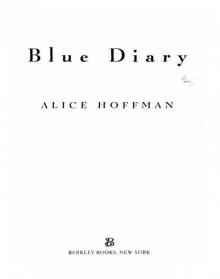 Blue Diary
Blue Diary The River King
The River King Here on Earth
Here on Earth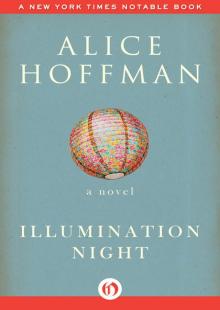 Illumination Night: A Novel
Illumination Night: A Novel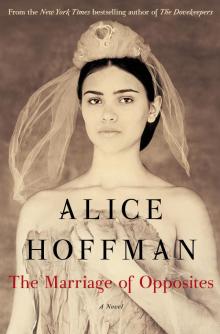 The Marriage of Opposites
The Marriage of Opposites Nightbird
Nightbird Incantation
Incantation Skylight Confessions
Skylight Confessions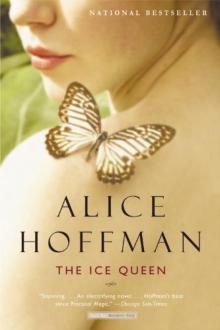 The Ice Queen
The Ice Queen Second Nature
Second Nature Fortune's Daughter: A Novel
Fortune's Daughter: A Novel Seventh Heaven
Seventh Heaven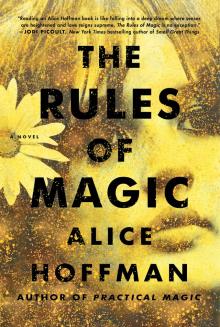 The Rules of Magic
The Rules of Magic The Red Garden
The Red Garden The Third Angel
The Third Angel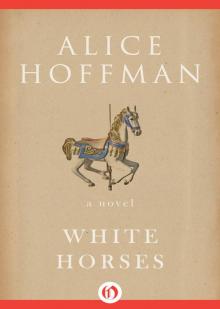 White Horses
White Horses Property of / the Drowning Season / Fortune's Daughter / at Risk
Property of / the Drowning Season / Fortune's Daughter / at Risk Angel Landing
Angel Landing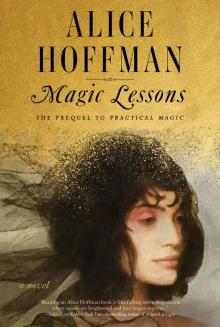 Magic Lessons
Magic Lessons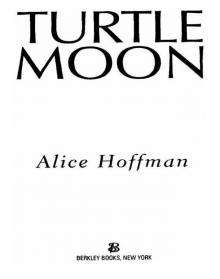 Turtle Moon
Turtle Moon Aquamarine
Aquamarine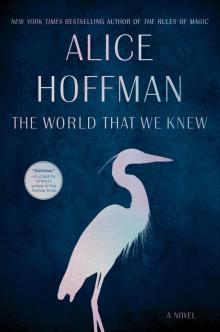 The World That We Knew
The World That We Knew Faithful
Faithful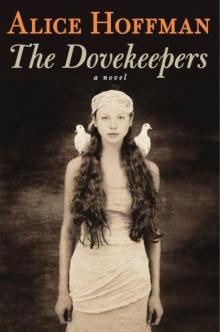 The Dovekeepers
The Dovekeepers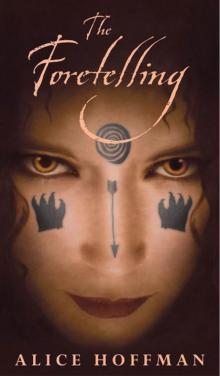 The Foretelling
The Foretelling Green Angel
Green Angel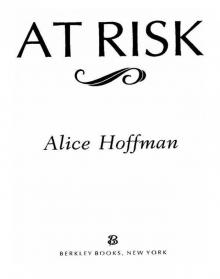 At Risk
At Risk Green Heart
Green Heart Fortune's Daughter
Fortune's Daughter Faerie Knitting
Faerie Knitting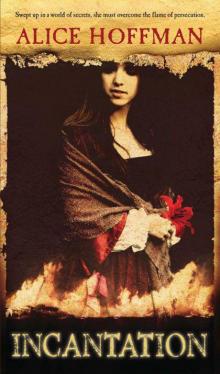 Incantation (v5)
Incantation (v5) Green Witch
Green Witch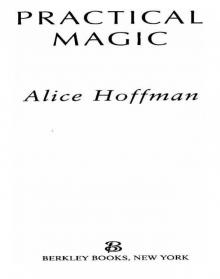 Practical Magic
Practical Magic The Museum of Extraordinary Things
The Museum of Extraordinary Things The Probable Future
The Probable Future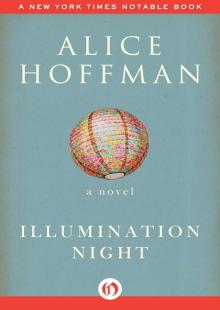 Illumination Night
Illumination Night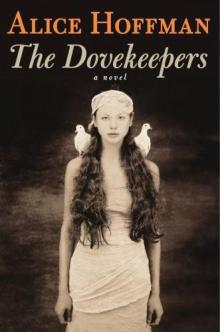 The Dovekeepers: A Novel
The Dovekeepers: A Novel Property Of, the Drowning Season, Fortune's Daughter, and At Risk
Property Of, the Drowning Season, Fortune's Daughter, and At Risk